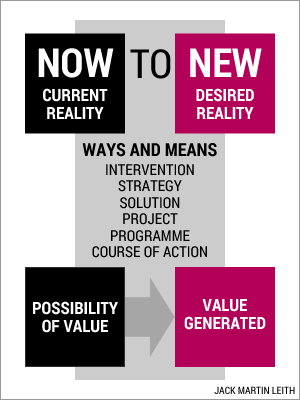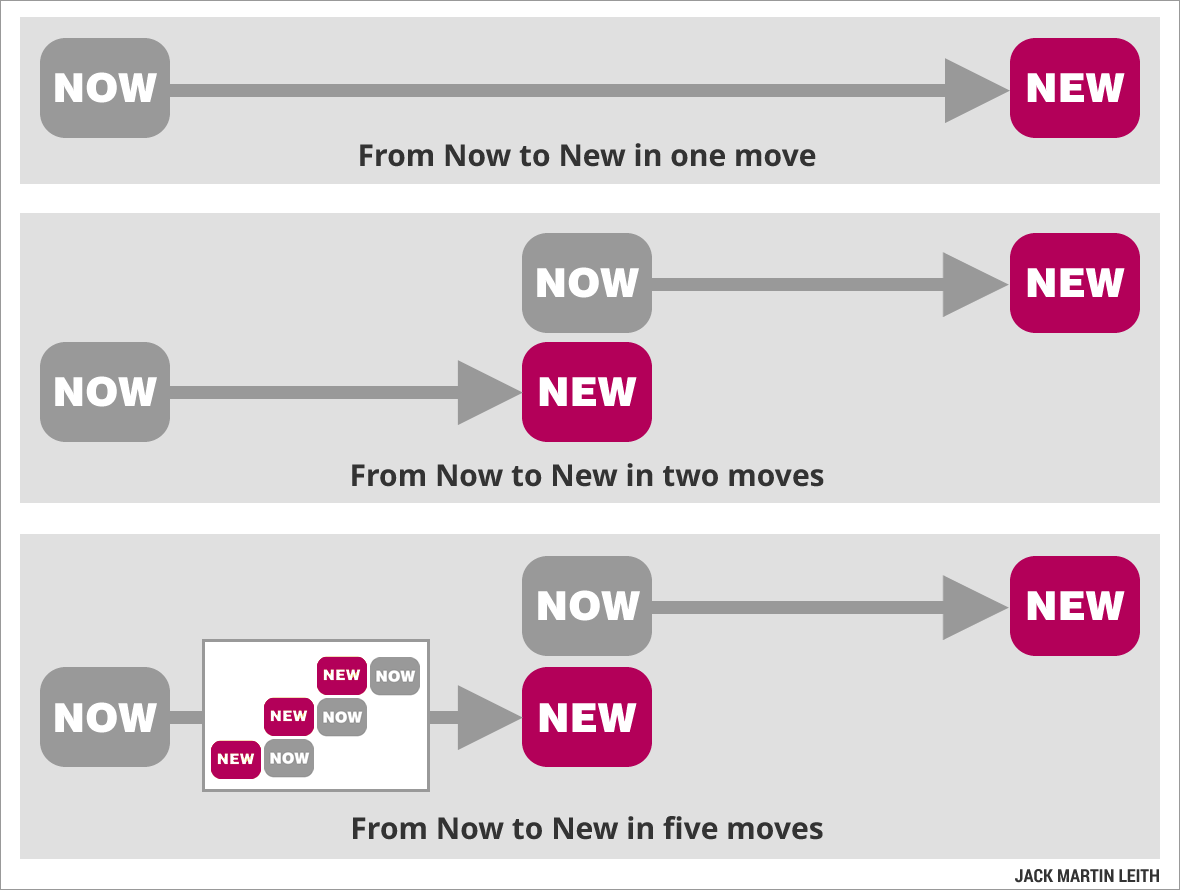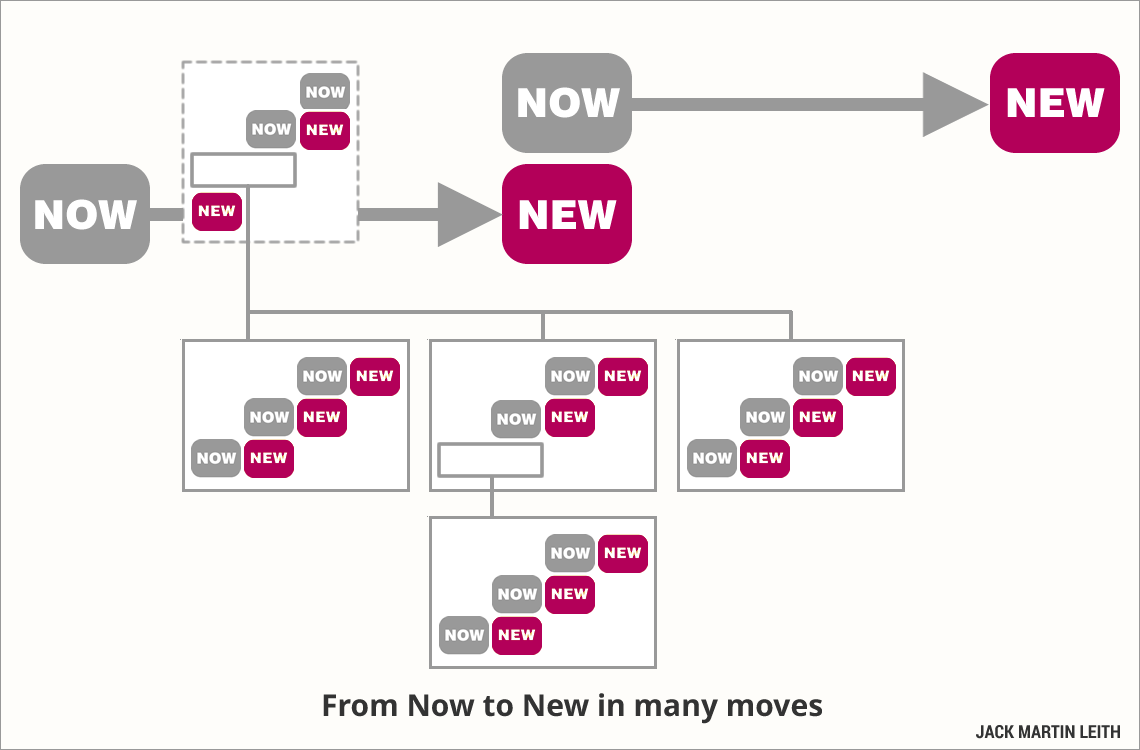Now-to-New, a term I invented in the early 1990s, refers to the act of turning the present situation (Now) into what is needed instead (New), with particular attention given to the downstream value that will result.

Now-to-New is a blanket term covering seven categories of work: creating, problem solving, changing, surmounting, responding, developing, and realising potential.
The seven categories are neither mutually exclusive nor collectively exhaustive.
Creating
Creating new products, services, enterprises, work practices, anything.
Now: There is a need, desire or opportunity to create something that will generate extensive or exceptional value.
New: The new creation exists and is generating the imagined value.
Problem transformation
Turning a problematic state of affairs into an unproblematic one.
Now: A problematic state of affairs exists.The state of affairs is the combination of circumstances applying within a society or group at a particular time. The current state of affairs may be considered acceptable by many observers, but not necessarily by all. The state of affairs may present a challenge, or be complicated, or contain a conflict of interest. The status quo represents the existing state of affairs1.
Source: Wikipedia
1. Aka current state of affairs, current situation, current reality, As Is, Now.
New: The problematic state of affairs no longer exists.
Changing
Effecting a change from the current state of affairs to the desired state.
Now: A different state of affairs is desired.
New: The desired state of affairs prevails.
Surmounting
Overcoming a seemingly impossible challenge.
Now: There is a need, desire or opportunity to surmount a tough challenge.
New: The challenge has been surmounted.
Responding
Responding to a request or demand.
Now: A request or demand has been received.
New: The request or demand has been fulfilled.
Developing
Increasing value generation capability or value generation potential.
Potential is the what (the possible future yield) and capability is the how (skilled people, equipment, money and other means).
Now: Value generation capability is not at the required level.
New: Value generation capability is at the required level.
Realising potential
Utilising value generation capability or realising value generation potential.
Now: Value generation potential is not being fully realised.
New: Value generation potential is being fully realised.
Some actual Now-to-New projects, selected from my casebook
Client names will be provided on request.
Creating
A global food manufacturer wants to create — overnight — a concept for a new product, inspired and evaluated by potential customers. How can this be achieved?
Changing
A state-owned rail operator in continental Europe intends to shift ticket purchasing from service counters to self-service machines, but the plan is meeting strong opposition from service counter staff. How can this situation be resolved to everyone’s satisfaction?
The management teams of two hospitals, twenty miles apart, want to integrate 35 services including emergency care. The conversation is being dominated by a well-organized “Save Our A&E” campaign that has gained the strong support of a local newspaper. How can the integration be accomplished successfully, and with minimum disruption and distress?
Problem transformation
The sales and marketing functions of a global corporate are at loggerheads and this is having a negative impact on the business. How might the situation be resolved to everyone’s satisfaction?
Surmounting
There is a serious threat of new dog-to-human diseases entering the UK. How can the threat be eradicated?
An oil and gas company located in Oman has discovered an oil reservoir in a rare type of rock. Can the oil be produced at a commercial price?
Responding
The CEO of a Dublin-based brewer has received a directive from the parent company’s chairman, instructing the brewer’s management team to establish a direct connection with its customers, and not by means of qualitative research. How can this connection be made?
The bosses of an R&D facility within a multinational have spent many months developing an innovation strategy. Facility staff are now charged with the task of finding ways to put the strategy into action. How will they respond?
The contract to provide community arts services in the Welsh valleys has been awarded to an alliance of local authorities. How can the alliance’s Year 1 objectives be achieved?
Developing
Members of a specialist unit within a UK government agency have an urgent need to plan, organise and facilitate a series of Open Space meetings, but they lack the specialist skills and very little time is available for training. How can these skills be acquired in a single half-day workshop?
Realising potential
A global oil and gas company needs to find a good use for the water — saline and contaminated with heavy metals — that accompanies oil as it emerges from the subsurface. How might this be accomplished?
From Now to New in one move or multiple moves
Now-to-New work happens sequentially, in parallel, recursively, or all of these. Each successive New becomes the next Now.


It is important to note that the ‘to’ in Now-to-New does not imply a time interval. Rather, it denotes a course of action that turns the current state of affairs (Now) into the desired state of affairs (New) as quickly, effortlessly and unobtrusively as possible, and with no collateral damage or unintended consequences.
Each shift from Now to New happens in the moment, no matter how the required course of action may be framed: create something new, solve a pressing problem, effect a change or whatever. An almost-solved problem is an unsolved problem. A change has not occurred until the desired state of affairs exists and persists. The Gordian Knot remained intact until Alexander the Great loosed it with a single slash of his sword.
Continue reading
External websites
The NOW of work: Why wait for the future? Video — runtime 48:14. Niels Pflaeging (Red42, BetaCodex) in conversation with Rijon Erickson
This website
How the term Now-to-New came into being
Three create-the-new work modes: creating alone, creating together and helping others create
How does Newcreate compare with design thinking?
Newcreate and other create-the-new methods
Index to entire site (60+ pages)
Search the site
Not case sensitive. Do not to hit return.